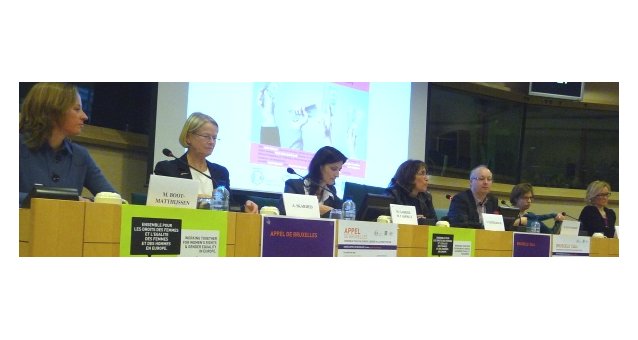EWL co-hosts conference putting abolition of prostitution on European agenda

[Brussels, 13 December 2012] On 04 December, the EWL co-organised together with the Fondation Scelles and the Mouvement du Nid (and with the support of MEPs Mariya Gabriel and Mikael Gustafsson) a European conference entitled “10 years of policies on prostitution: Outcomes of the Swedish and Dutch options, and ways forward”. Turnout for the conference, held in the European Parliament in Brussels, was even better than expected, with more than 250 participants, including more than a dozen Members of the European Parliament. In addition to the expertise and knowledge of the invited speakers, the conference put the perspectives and goals of women’s NGOs on the European political agenda, and opened the way for a new and structured dialogue between decision-makers and civil society organisations.
When it comes to discussing prostitution, both the values and views on the issue and the legislative approaches are debated. With this conference, the EWL proposed to compare the two main opposing policy approaches to prostitution, namely the Swedish and the Dutch models, and to invite officials and NGOs to discuss the outcomes after ten years of implementation.
While the Swedish approach seems to have succeeded in reducing prostitution and trafficking, getting public support, and protecting persons affected by prostitution, the Dutch model seems to fail in addressing the increase of organised crime and the decrease of well-being of prostituted persons.
Swedish Chancelor of Justice Anna Skarhed recalled the principles behind the Swedish approach: prostitution is a form of violence against women and an obstacle to gender equality; the system of prostitution has to be addressed as a whole, with the demand being understood as the root cause of prostitution, education and awareness raising as key tools for social change, and protection and exit programmes to be a priority.
Senior Researcher Machteld Boot-Matthijssen, from the office of the Dutch National Rapporteur on Trafficking in Human Beings, explained that the rationale behind the Dutch model was to decriminalise the exploitation of prostitution and normalise prostitution as a profession. These measures aim at allowing the state to better control the legal sector and improving the fight against trafficking in human beings. However, she highlighted the fact that after ten years, the Netherlands has seen several notorious sex trafficking cases showing that widespread exploitation can also take place in the licensed prostitution sector.
Olga Persson, from the Swedish organisation SKR, and Karin Werkman, Dutch researcher, confirmed the trends observed in both countries: while in Sweden, the law needs to be strengthened (by addressing compensation for victims or giving an extra-territorial nature to the Swedish law), the Dutch model has normalised prostitution and given a worryingly strong voice to sex buyers and pimps.
A second panel looked at ways forwards when it comes to policy debates and developments on prostitution.
Belgian Deputy Prime Minister and Minister for Interior and Equality, Joëlle Milquet, presented the legislative situation in Belgium, as well as a recent study by the Federal Police, which found out that there are 23 000 persons affected by prostitution in Belgium, 80% of them being victims of exploitation. 10% reported having suffered from very serious forms of violence, 90% report serious mental health problems such as PTSD syndrome and suicidal thoughts. According to Joëlle Milquet, “It is not possible to trivialise the presentation of the female body as a sex object”.
Caroline De Haas, Advisor in the Cabinet of the French Minister for Women’s Rights, Najat Vallaud Belkacem, presented the abolitionist perspective of France, based on two key principles: prostitution is incompatible with equality between women and men, and cannot be accepted as it treats the human body as a product.
Both ministers met in Brussels in September and decided to organise a European conference next year, looking at the implementation by member states of the 1949 UN Convention for the Suppression of the Traffic in Persons and of the Exploitation of the Prostitution of Others.
Then, EU Anti-Trafficking Coordinator Myria Vassiliadou gave facts and figures about the situation of sexual exploitation in the EU, highlighting the highly gendered nature of the phenomenon and its recent worrying increase in the EU.
Following these two panels, the signatory NGOs unveiled their Brussels’ Call ‘Together for a Europe free from prostitution’, represented by Pierrette Pape, EWL Policy Officer, and Grégoire Théry, Secretary General of Mouvement du Nid France. Rosen Hicher, a survivor of prostitution, supported the call and called on everyone to understand the reality of prostitution and the crucial need of support and assistance for women wishing to exit the system of prostitution. She also pointed out to the role of the demand side: “When there are no more sex buyers, there will be no more survivors”.
The conference ended with contributions and commitments of Members of the European Parliamant, coming from various countries and political groups in the EP: Emer Costello (Ireland, S&D), Sophie Auconie (France, EPP), Antonyia Parvanova (Bulgaria, ALDE), Nicole Kiil-Nielsen (France, Greens), and Inês Zuber (Portugal, GUE) expressed their support for the abolitionist perspective on prostitution, highlighting various aspects of the issue (prevention, feminist values, support to women, addressing demand, tackling women’s inequalities, etc.).
EWL President Viviane Teitelbaum concluded, together with MEPs Mariya Gabriel and Mikael Gustafsson, by recalling the importance of the event in launching the debate at European level, and said that the EWL and its partners will continue to work at all levels towards a Europe free from prostitution.
Check out this same page next week to get the speakers’ presentations and more photos about the event.
Visit EWL’s webpage ‘Press coverage’ to read media articles about the conference and the Brussels’ Call.
Read the article of FreeIrishWomen, survivor of prostitution: ‘Trafficking and Prostitution – and the Differences that Don’t Exist’.
Find out more about EWL’s campaign ‘Together for a Europe free from prostitution’, which has been awarded Campaign of the Year by the EPA Awards 2012.
More information: Contact Pierrette Pape, EWL Policy Officer and Project Coordinator, pape@womenlobby.org.




